Entrepreneurship and Small Business Management Report - NSAB925B9JO
VerifiedAdded on 2023/01/06
|18
|5954
|96
Report
AI Summary
This report delves into the multifaceted world of entrepreneurship and small business management, exploring various types of entrepreneurial ventures, including small, large, social, and scalable models, and their interrelation with typologies of entrepreneurship. It differentiates between micro, small, medium, and large businesses, highlighting their distinct characteristics. The report analyzes the significant impact of micro and small businesses on the economy, supported by relevant data and statistics, and emphasizes their importance in fostering the growth of the social economy. Furthermore, it identifies key entrepreneurial traits and skills that distinguish successful entrepreneurs from other business managers, assessing how personality aspects reflect entrepreneurial motivation and mindset. The report also examines how background and experience can either hinder or foster entrepreneurship, providing relevant examples to illustrate these dynamics, and concludes by summarizing the key findings and insights.

Entrepreneurship and
Small Business
Management
Small Business
Management
Paraphrase This Document
Need a fresh take? Get an instant paraphrase of this document with our AI Paraphraser
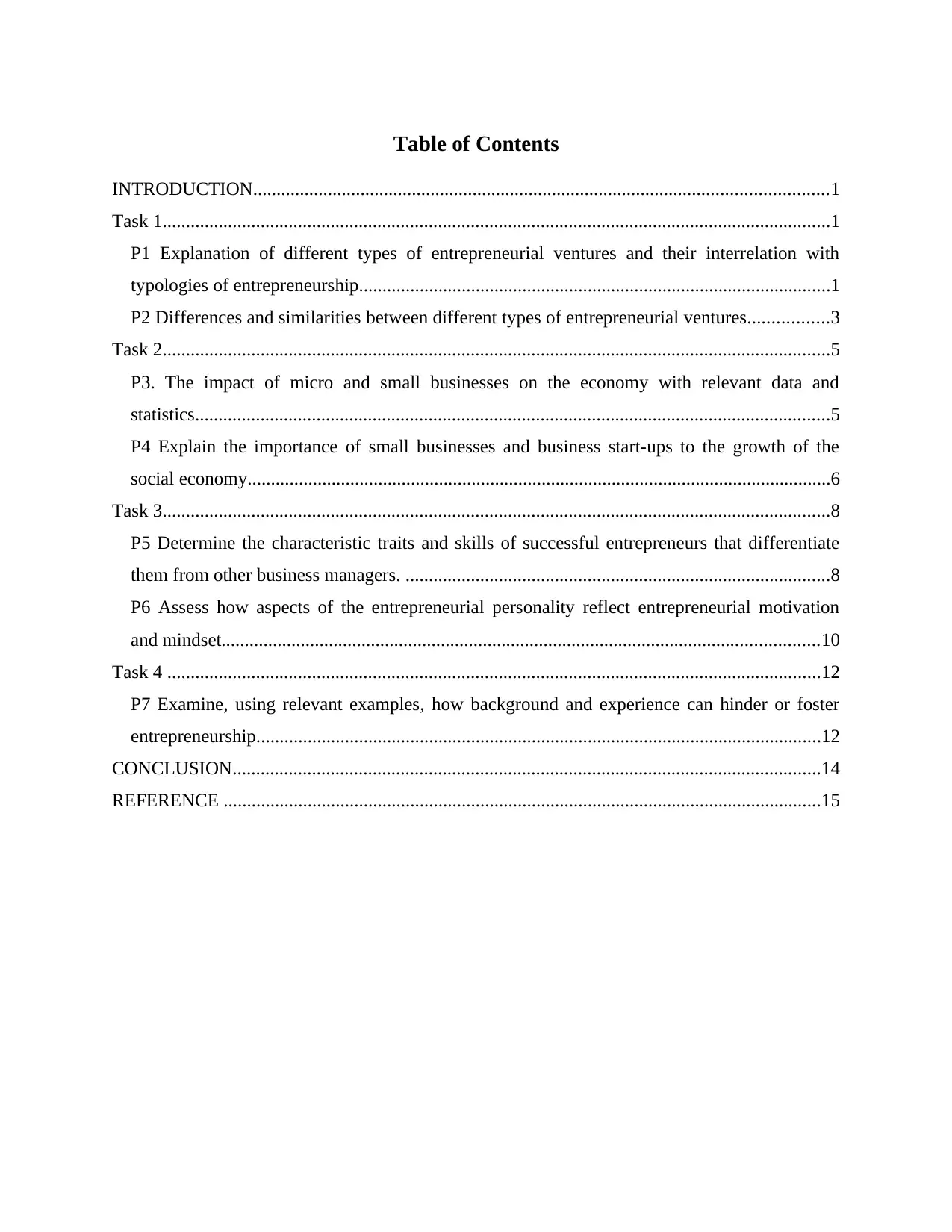
Table of Contents
INTRODUCTION...........................................................................................................................1
Task 1...............................................................................................................................................1
P1 Explanation of different types of entrepreneurial ventures and their interrelation with
typologies of entrepreneurship.....................................................................................................1
P2 Differences and similarities between different types of entrepreneurial ventures.................3
Task 2...............................................................................................................................................5
P3. The impact of micro and small businesses on the economy with relevant data and
statistics........................................................................................................................................5
P4 Explain the importance of small businesses and business start-ups to the growth of the
social economy.............................................................................................................................6
Task 3...............................................................................................................................................8
P5 Determine the characteristic traits and skills of successful entrepreneurs that differentiate
them from other business managers. ...........................................................................................8
P6 Assess how aspects of the entrepreneurial personality reflect entrepreneurial motivation
and mindset................................................................................................................................10
Task 4 ............................................................................................................................................12
P7 Examine, using relevant examples, how background and experience can hinder or foster
entrepreneurship.........................................................................................................................12
CONCLUSION..............................................................................................................................14
REFERENCE ................................................................................................................................15
INTRODUCTION...........................................................................................................................1
Task 1...............................................................................................................................................1
P1 Explanation of different types of entrepreneurial ventures and their interrelation with
typologies of entrepreneurship.....................................................................................................1
P2 Differences and similarities between different types of entrepreneurial ventures.................3
Task 2...............................................................................................................................................5
P3. The impact of micro and small businesses on the economy with relevant data and
statistics........................................................................................................................................5
P4 Explain the importance of small businesses and business start-ups to the growth of the
social economy.............................................................................................................................6
Task 3...............................................................................................................................................8
P5 Determine the characteristic traits and skills of successful entrepreneurs that differentiate
them from other business managers. ...........................................................................................8
P6 Assess how aspects of the entrepreneurial personality reflect entrepreneurial motivation
and mindset................................................................................................................................10
Task 4 ............................................................................................................................................12
P7 Examine, using relevant examples, how background and experience can hinder or foster
entrepreneurship.........................................................................................................................12
CONCLUSION..............................................................................................................................14
REFERENCE ................................................................................................................................15
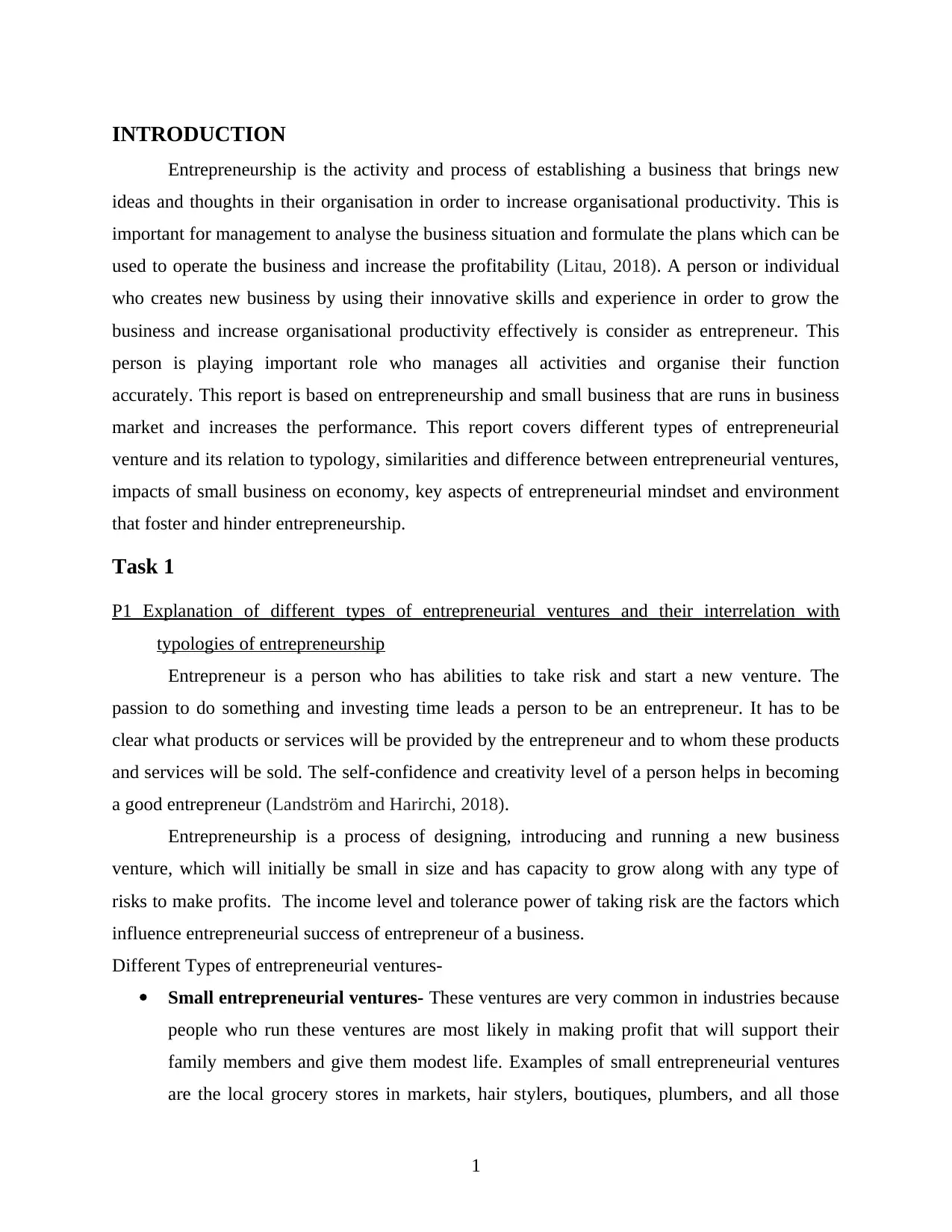
INTRODUCTION
Entrepreneurship is the activity and process of establishing a business that brings new
ideas and thoughts in their organisation in order to increase organisational productivity. This is
important for management to analyse the business situation and formulate the plans which can be
used to operate the business and increase the profitability (Litau, 2018). A person or individual
who creates new business by using their innovative skills and experience in order to grow the
business and increase organisational productivity effectively is consider as entrepreneur. This
person is playing important role who manages all activities and organise their function
accurately. This report is based on entrepreneurship and small business that are runs in business
market and increases the performance. This report covers different types of entrepreneurial
venture and its relation to typology, similarities and difference between entrepreneurial ventures,
impacts of small business on economy, key aspects of entrepreneurial mindset and environment
that foster and hinder entrepreneurship.
Task 1
P1 Explanation of different types of entrepreneurial ventures and their interrelation with
typologies of entrepreneurship
Entrepreneur is a person who has abilities to take risk and start a new venture. The
passion to do something and investing time leads a person to be an entrepreneur. It has to be
clear what products or services will be provided by the entrepreneur and to whom these products
and services will be sold. The self-confidence and creativity level of a person helps in becoming
a good entrepreneur (Landström and Harirchi, 2018).
Entrepreneurship is a process of designing, introducing and running a new business
venture, which will initially be small in size and has capacity to grow along with any type of
risks to make profits. The income level and tolerance power of taking risk are the factors which
influence entrepreneurial success of entrepreneur of a business.
Different Types of entrepreneurial ventures-
Small entrepreneurial ventures- These ventures are very common in industries because
people who run these ventures are most likely in making profit that will support their
family members and give them modest life. Examples of small entrepreneurial ventures
are the local grocery stores in markets, hair stylers, boutiques, plumbers, and all those
1
Entrepreneurship is the activity and process of establishing a business that brings new
ideas and thoughts in their organisation in order to increase organisational productivity. This is
important for management to analyse the business situation and formulate the plans which can be
used to operate the business and increase the profitability (Litau, 2018). A person or individual
who creates new business by using their innovative skills and experience in order to grow the
business and increase organisational productivity effectively is consider as entrepreneur. This
person is playing important role who manages all activities and organise their function
accurately. This report is based on entrepreneurship and small business that are runs in business
market and increases the performance. This report covers different types of entrepreneurial
venture and its relation to typology, similarities and difference between entrepreneurial ventures,
impacts of small business on economy, key aspects of entrepreneurial mindset and environment
that foster and hinder entrepreneurship.
Task 1
P1 Explanation of different types of entrepreneurial ventures and their interrelation with
typologies of entrepreneurship
Entrepreneur is a person who has abilities to take risk and start a new venture. The
passion to do something and investing time leads a person to be an entrepreneur. It has to be
clear what products or services will be provided by the entrepreneur and to whom these products
and services will be sold. The self-confidence and creativity level of a person helps in becoming
a good entrepreneur (Landström and Harirchi, 2018).
Entrepreneurship is a process of designing, introducing and running a new business
venture, which will initially be small in size and has capacity to grow along with any type of
risks to make profits. The income level and tolerance power of taking risk are the factors which
influence entrepreneurial success of entrepreneur of a business.
Different Types of entrepreneurial ventures-
Small entrepreneurial ventures- These ventures are very common in industries because
people who run these ventures are most likely in making profit that will support their
family members and give them modest life. Examples of small entrepreneurial ventures
are the local grocery stores in markets, hair stylers, boutiques, plumbers, and all those
1
⊘ This is a preview!⊘
Do you want full access?
Subscribe today to unlock all pages.

Trusted by 1+ million students worldwide
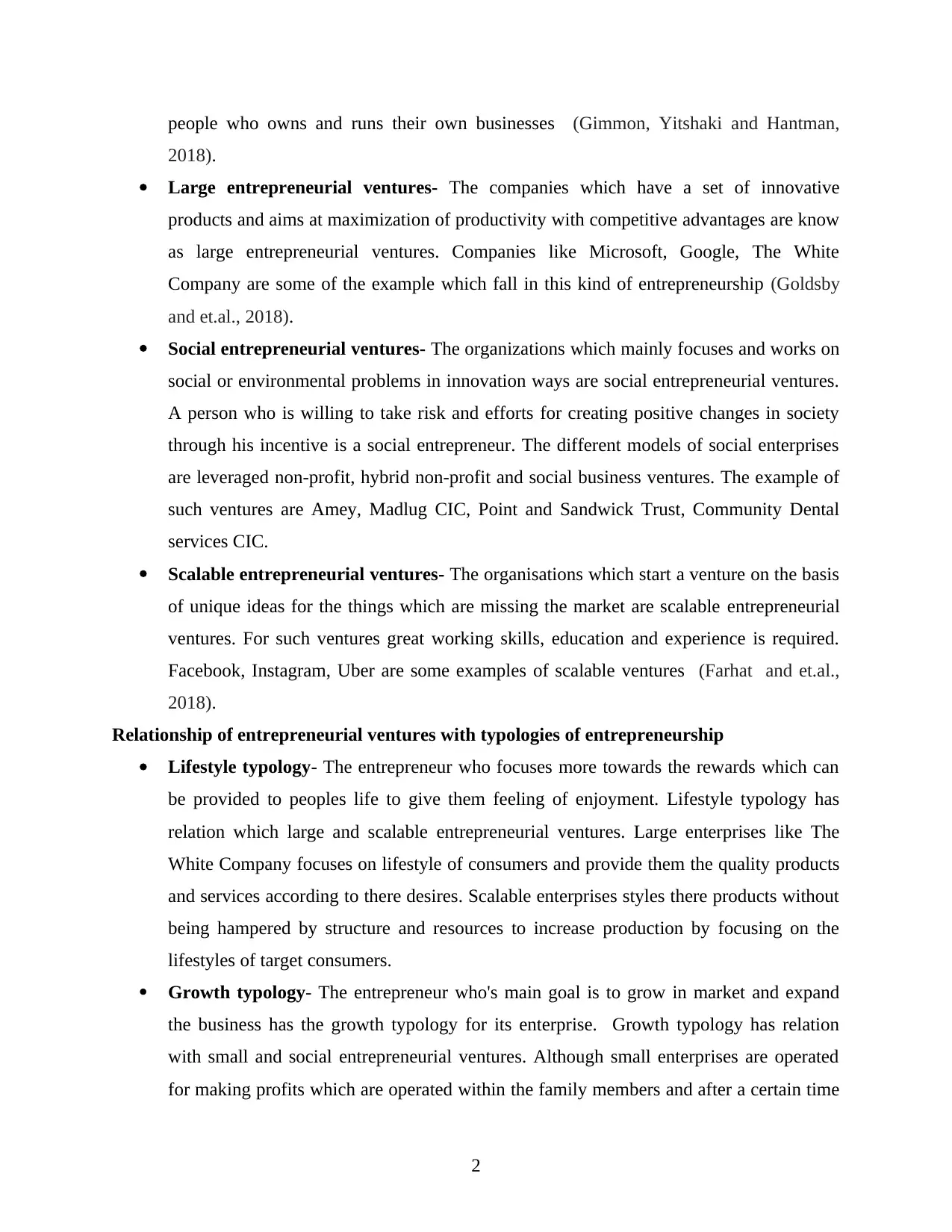
people who owns and runs their own businesses (Gimmon, Yitshaki and Hantman,
2018).
Large entrepreneurial ventures- The companies which have a set of innovative
products and aims at maximization of productivity with competitive advantages are know
as large entrepreneurial ventures. Companies like Microsoft, Google, The White
Company are some of the example which fall in this kind of entrepreneurship (Goldsby
and et.al., 2018).
Social entrepreneurial ventures- The organizations which mainly focuses and works on
social or environmental problems in innovation ways are social entrepreneurial ventures.
A person who is willing to take risk and efforts for creating positive changes in society
through his incentive is a social entrepreneur. The different models of social enterprises
are leveraged non-profit, hybrid non-profit and social business ventures. The example of
such ventures are Amey, Madlug CIC, Point and Sandwick Trust, Community Dental
services CIC.
Scalable entrepreneurial ventures- The organisations which start a venture on the basis
of unique ideas for the things which are missing the market are scalable entrepreneurial
ventures. For such ventures great working skills, education and experience is required.
Facebook, Instagram, Uber are some examples of scalable ventures (Farhat and et.al.,
2018).
Relationship of entrepreneurial ventures with typologies of entrepreneurship
Lifestyle typology- The entrepreneur who focuses more towards the rewards which can
be provided to peoples life to give them feeling of enjoyment. Lifestyle typology has
relation which large and scalable entrepreneurial ventures. Large enterprises like The
White Company focuses on lifestyle of consumers and provide them the quality products
and services according to there desires. Scalable enterprises styles there products without
being hampered by structure and resources to increase production by focusing on the
lifestyles of target consumers.
Growth typology- The entrepreneur who's main goal is to grow in market and expand
the business has the growth typology for its enterprise. Growth typology has relation
with small and social entrepreneurial ventures. Although small enterprises are operated
for making profits which are operated within the family members and after a certain time
2
2018).
Large entrepreneurial ventures- The companies which have a set of innovative
products and aims at maximization of productivity with competitive advantages are know
as large entrepreneurial ventures. Companies like Microsoft, Google, The White
Company are some of the example which fall in this kind of entrepreneurship (Goldsby
and et.al., 2018).
Social entrepreneurial ventures- The organizations which mainly focuses and works on
social or environmental problems in innovation ways are social entrepreneurial ventures.
A person who is willing to take risk and efforts for creating positive changes in society
through his incentive is a social entrepreneur. The different models of social enterprises
are leveraged non-profit, hybrid non-profit and social business ventures. The example of
such ventures are Amey, Madlug CIC, Point and Sandwick Trust, Community Dental
services CIC.
Scalable entrepreneurial ventures- The organisations which start a venture on the basis
of unique ideas for the things which are missing the market are scalable entrepreneurial
ventures. For such ventures great working skills, education and experience is required.
Facebook, Instagram, Uber are some examples of scalable ventures (Farhat and et.al.,
2018).
Relationship of entrepreneurial ventures with typologies of entrepreneurship
Lifestyle typology- The entrepreneur who focuses more towards the rewards which can
be provided to peoples life to give them feeling of enjoyment. Lifestyle typology has
relation which large and scalable entrepreneurial ventures. Large enterprises like The
White Company focuses on lifestyle of consumers and provide them the quality products
and services according to there desires. Scalable enterprises styles there products without
being hampered by structure and resources to increase production by focusing on the
lifestyles of target consumers.
Growth typology- The entrepreneur who's main goal is to grow in market and expand
the business has the growth typology for its enterprise. Growth typology has relation
with small and social entrepreneurial ventures. Although small enterprises are operated
for making profits which are operated within the family members and after a certain time
2
Paraphrase This Document
Need a fresh take? Get an instant paraphrase of this document with our AI Paraphraser
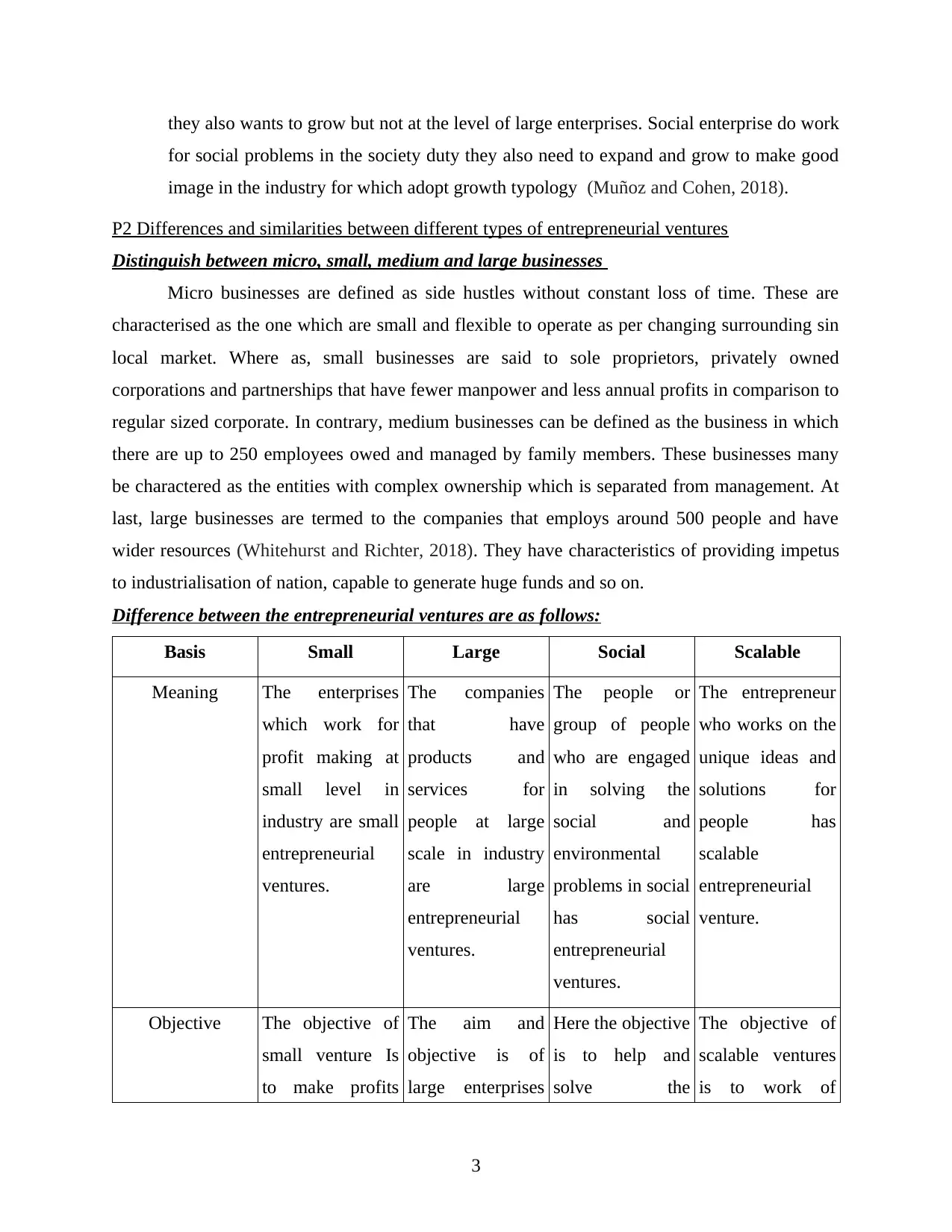
they also wants to grow but not at the level of large enterprises. Social enterprise do work
for social problems in the society duty they also need to expand and grow to make good
image in the industry for which adopt growth typology (Muñoz and Cohen, 2018).
P2 Differences and similarities between different types of entrepreneurial ventures
Distinguish between micro, small, medium and large businesses
Micro businesses are defined as side hustles without constant loss of time. These are
characterised as the one which are small and flexible to operate as per changing surrounding sin
local market. Where as, small businesses are said to sole proprietors, privately owned
corporations and partnerships that have fewer manpower and less annual profits in comparison to
regular sized corporate. In contrary, medium businesses can be defined as the business in which
there are up to 250 employees owed and managed by family members. These businesses many
be charactered as the entities with complex ownership which is separated from management. At
last, large businesses are termed to the companies that employs around 500 people and have
wider resources (Whitehurst and Richter, 2018). They have characteristics of providing impetus
to industrialisation of nation, capable to generate huge funds and so on.
Difference between the entrepreneurial ventures are as follows:
Basis Small Large Social Scalable
Meaning The enterprises
which work for
profit making at
small level in
industry are small
entrepreneurial
ventures.
The companies
that have
products and
services for
people at large
scale in industry
are large
entrepreneurial
ventures.
The people or
group of people
who are engaged
in solving the
social and
environmental
problems in social
has social
entrepreneurial
ventures.
The entrepreneur
who works on the
unique ideas and
solutions for
people has
scalable
entrepreneurial
venture.
Objective The objective of
small venture Is
to make profits
The aim and
objective is of
large enterprises
Here the objective
is to help and
solve the
The objective of
scalable ventures
is to work of
3
for social problems in the society duty they also need to expand and grow to make good
image in the industry for which adopt growth typology (Muñoz and Cohen, 2018).
P2 Differences and similarities between different types of entrepreneurial ventures
Distinguish between micro, small, medium and large businesses
Micro businesses are defined as side hustles without constant loss of time. These are
characterised as the one which are small and flexible to operate as per changing surrounding sin
local market. Where as, small businesses are said to sole proprietors, privately owned
corporations and partnerships that have fewer manpower and less annual profits in comparison to
regular sized corporate. In contrary, medium businesses can be defined as the business in which
there are up to 250 employees owed and managed by family members. These businesses many
be charactered as the entities with complex ownership which is separated from management. At
last, large businesses are termed to the companies that employs around 500 people and have
wider resources (Whitehurst and Richter, 2018). They have characteristics of providing impetus
to industrialisation of nation, capable to generate huge funds and so on.
Difference between the entrepreneurial ventures are as follows:
Basis Small Large Social Scalable
Meaning The enterprises
which work for
profit making at
small level in
industry are small
entrepreneurial
ventures.
The companies
that have
products and
services for
people at large
scale in industry
are large
entrepreneurial
ventures.
The people or
group of people
who are engaged
in solving the
social and
environmental
problems in social
has social
entrepreneurial
ventures.
The entrepreneur
who works on the
unique ideas and
solutions for
people has
scalable
entrepreneurial
venture.
Objective The objective of
small venture Is
to make profits
The aim and
objective is of
large enterprises
Here the objective
is to help and
solve the
The objective of
scalable ventures
is to work of
3

and sustain in
market.
is to have expand
and maximize
profits by taking
competitive
advantage.
problems which
are related to the
society or
environment.
unique ideas and
come up with
different products
and services
which can attract
people easily.
Size The maximum
number of
employees in
small enterprise
are 50 and the
minimum number
is 10 memers.
Large ventures
have at least 5000
employees and
the annual
turnover is also
greater than 1.5
billions.
The size of social
ventures can be
between 50- 100
people who
mainly operate
activities which
may have
volunteers to
work on.
In scalable
enterprises 50-
150 people are
involved who
think on
innovative ideas
and work on the
execution.
Risk Involved The risk involved
in small
enterprises is not
to high, as what
they earn is spent
in short term
itself.
Large
entrepreneurial
ventures have
high risk
possibilities of
losses as they
invest more and
save less.
There is no much
risk involved in
terms of capital
but life of people
can be in risk.
Medium level of
risk is involved
that too in the
start of venture
and if the venture
succeeds
profitability stage
is expected by the
ventures.
Similarities between entrepreneurial ventures are as follows:
Basis Small Large Social Scalable
Employment
Opportunities
These enterprises
provide
employment
Large enterprise,
for example The
White Company
The people who
are more
interested in
The people who
can thing for
unique ideas and
4
market.
is to have expand
and maximize
profits by taking
competitive
advantage.
problems which
are related to the
society or
environment.
unique ideas and
come up with
different products
and services
which can attract
people easily.
Size The maximum
number of
employees in
small enterprise
are 50 and the
minimum number
is 10 memers.
Large ventures
have at least 5000
employees and
the annual
turnover is also
greater than 1.5
billions.
The size of social
ventures can be
between 50- 100
people who
mainly operate
activities which
may have
volunteers to
work on.
In scalable
enterprises 50-
150 people are
involved who
think on
innovative ideas
and work on the
execution.
Risk Involved The risk involved
in small
enterprises is not
to high, as what
they earn is spent
in short term
itself.
Large
entrepreneurial
ventures have
high risk
possibilities of
losses as they
invest more and
save less.
There is no much
risk involved in
terms of capital
but life of people
can be in risk.
Medium level of
risk is involved
that too in the
start of venture
and if the venture
succeeds
profitability stage
is expected by the
ventures.
Similarities between entrepreneurial ventures are as follows:
Basis Small Large Social Scalable
Employment
Opportunities
These enterprises
provide
employment
Large enterprise,
for example The
White Company
The people who
are more
interested in
The people who
can thing for
unique ideas and
4
⊘ This is a preview!⊘
Do you want full access?
Subscribe today to unlock all pages.

Trusted by 1+ million students worldwide
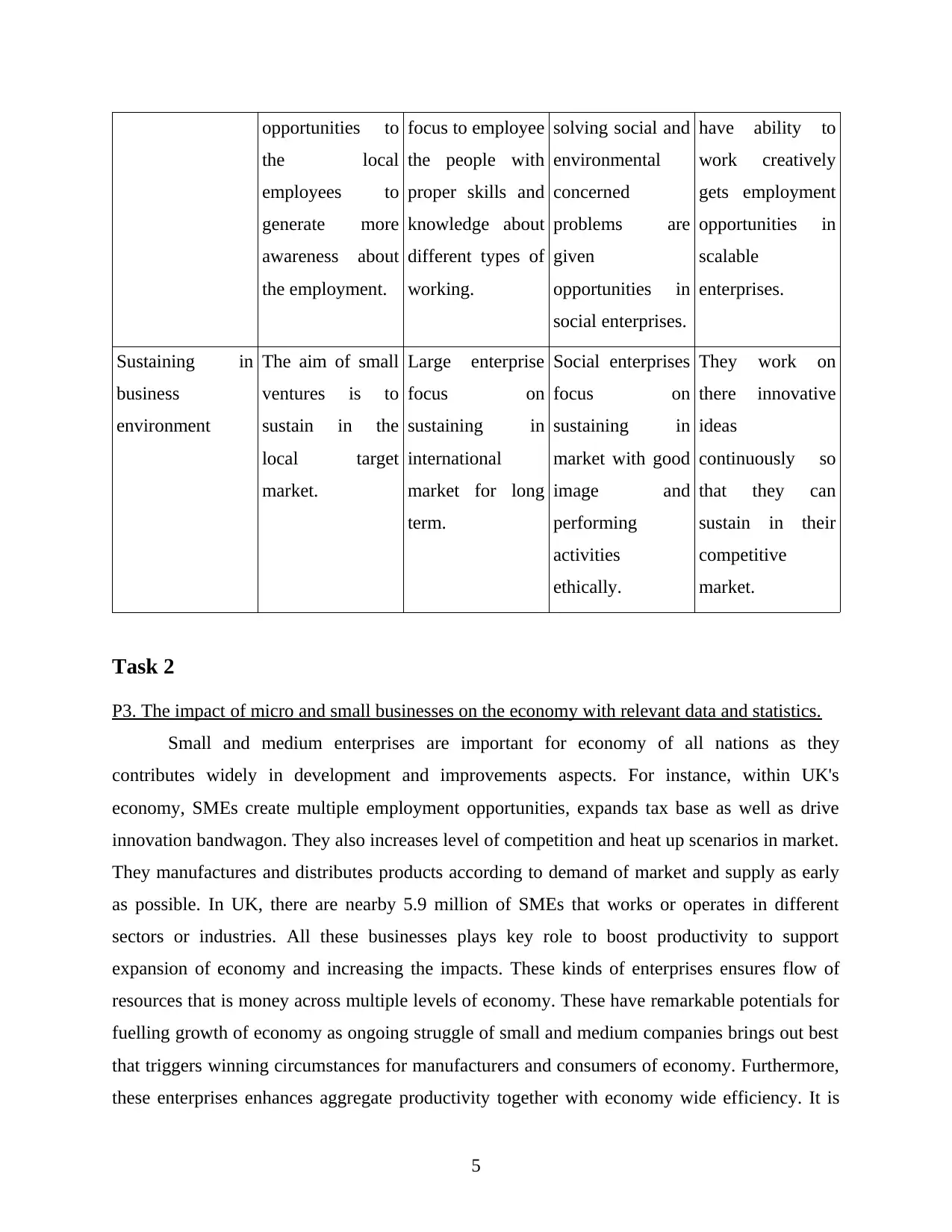
opportunities to
the local
employees to
generate more
awareness about
the employment.
focus to employee
the people with
proper skills and
knowledge about
different types of
working.
solving social and
environmental
concerned
problems are
given
opportunities in
social enterprises.
have ability to
work creatively
gets employment
opportunities in
scalable
enterprises.
Sustaining in
business
environment
The aim of small
ventures is to
sustain in the
local target
market.
Large enterprise
focus on
sustaining in
international
market for long
term.
Social enterprises
focus on
sustaining in
market with good
image and
performing
activities
ethically.
They work on
there innovative
ideas
continuously so
that they can
sustain in their
competitive
market.
Task 2
P3. The impact of micro and small businesses on the economy with relevant data and statistics.
Small and medium enterprises are important for economy of all nations as they
contributes widely in development and improvements aspects. For instance, within UK's
economy, SMEs create multiple employment opportunities, expands tax base as well as drive
innovation bandwagon. They also increases level of competition and heat up scenarios in market.
They manufactures and distributes products according to demand of market and supply as early
as possible. In UK, there are nearby 5.9 million of SMEs that works or operates in different
sectors or industries. All these businesses plays key role to boost productivity to support
expansion of economy and increasing the impacts. These kinds of enterprises ensures flow of
resources that is money across multiple levels of economy. These have remarkable potentials for
fuelling growth of economy as ongoing struggle of small and medium companies brings out best
that triggers winning circumstances for manufacturers and consumers of economy. Furthermore,
these enterprises enhances aggregate productivity together with economy wide efficiency. It is
5
the local
employees to
generate more
awareness about
the employment.
focus to employee
the people with
proper skills and
knowledge about
different types of
working.
solving social and
environmental
concerned
problems are
given
opportunities in
social enterprises.
have ability to
work creatively
gets employment
opportunities in
scalable
enterprises.
Sustaining in
business
environment
The aim of small
ventures is to
sustain in the
local target
market.
Large enterprise
focus on
sustaining in
international
market for long
term.
Social enterprises
focus on
sustaining in
market with good
image and
performing
activities
ethically.
They work on
there innovative
ideas
continuously so
that they can
sustain in their
competitive
market.
Task 2
P3. The impact of micro and small businesses on the economy with relevant data and statistics.
Small and medium enterprises are important for economy of all nations as they
contributes widely in development and improvements aspects. For instance, within UK's
economy, SMEs create multiple employment opportunities, expands tax base as well as drive
innovation bandwagon. They also increases level of competition and heat up scenarios in market.
They manufactures and distributes products according to demand of market and supply as early
as possible. In UK, there are nearby 5.9 million of SMEs that works or operates in different
sectors or industries. All these businesses plays key role to boost productivity to support
expansion of economy and increasing the impacts. These kinds of enterprises ensures flow of
resources that is money across multiple levels of economy. These have remarkable potentials for
fuelling growth of economy as ongoing struggle of small and medium companies brings out best
that triggers winning circumstances for manufacturers and consumers of economy. Furthermore,
these enterprises enhances aggregate productivity together with economy wide efficiency. It is
5
Paraphrase This Document
Need a fresh take? Get an instant paraphrase of this document with our AI Paraphraser

also analysed that SMEs bring forth ideas, skills as well as innovation in economy according to
changing situations. In almost all nations, these enterprises are large business proportion that
develop and create wider jobs for people and improve their living standards which impacts
favourably towards economy on specific country (Liñán, Paul and Fayolle, 2019).
(Source: Data about SMEs. 2017)
From the above graph, it is said that there are huge number of SMEs which contribute in
employment, turn over as well as businesses which impacts positively on economy of a nation.
For example, the employment opportunities has been seen at 48%, the turnover by 37% and the
businesses growth by 99.3% in the small ventures of UK. Were as the employment opportunities
has been 12%, turnover by 15% and businesses growth by 0.6% in medium enterprises of UK.
At last, it is concluded that SMEs makes wider contributions to develop and improve economy of
UK.
6
Illustration 1: Data about SMEs, 2017.
changing situations. In almost all nations, these enterprises are large business proportion that
develop and create wider jobs for people and improve their living standards which impacts
favourably towards economy on specific country (Liñán, Paul and Fayolle, 2019).
(Source: Data about SMEs. 2017)
From the above graph, it is said that there are huge number of SMEs which contribute in
employment, turn over as well as businesses which impacts positively on economy of a nation.
For example, the employment opportunities has been seen at 48%, the turnover by 37% and the
businesses growth by 99.3% in the small ventures of UK. Were as the employment opportunities
has been 12%, turnover by 15% and businesses growth by 0.6% in medium enterprises of UK.
At last, it is concluded that SMEs makes wider contributions to develop and improve economy of
UK.
6
Illustration 1: Data about SMEs, 2017.
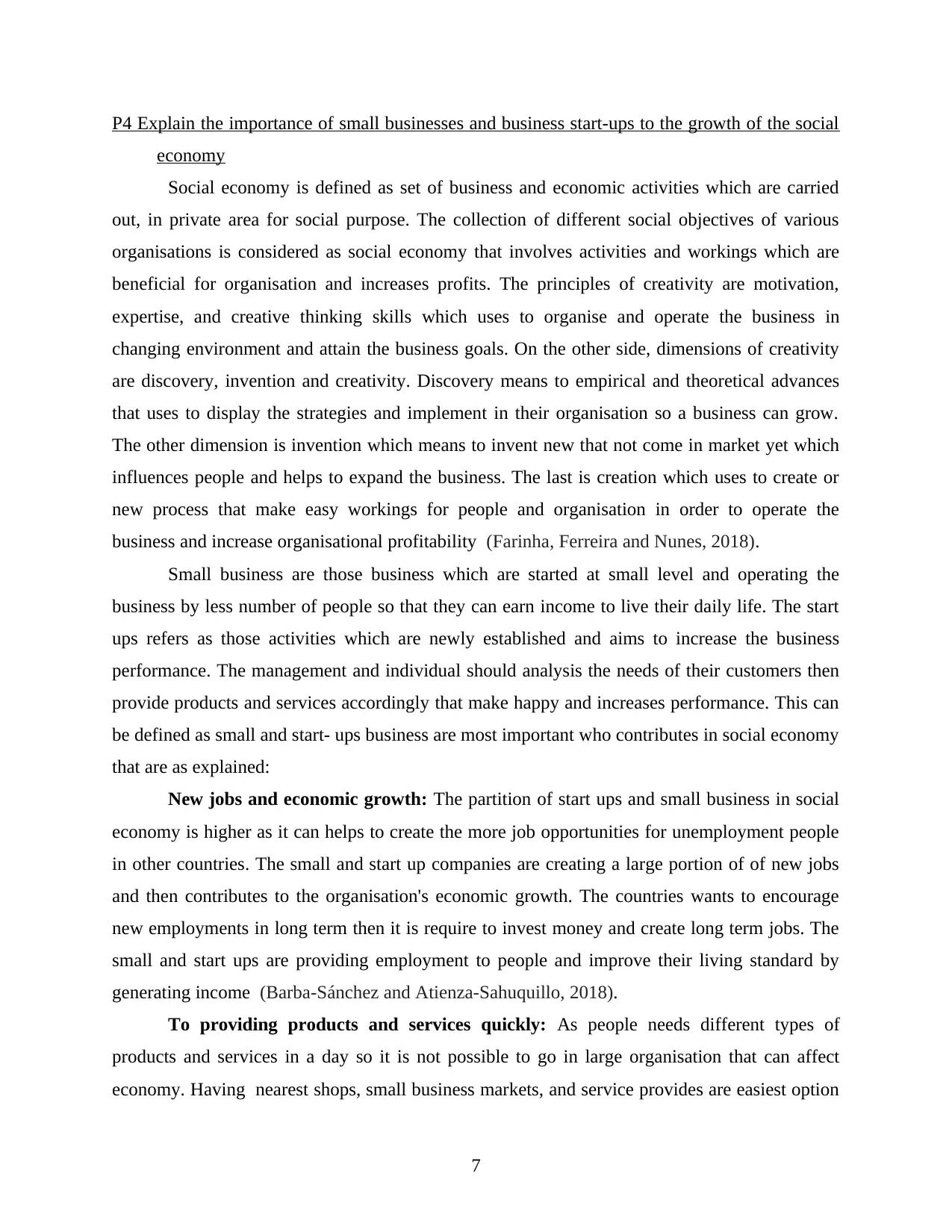
P4 Explain the importance of small businesses and business start-ups to the growth of the social
economy
Social economy is defined as set of business and economic activities which are carried
out, in private area for social purpose. The collection of different social objectives of various
organisations is considered as social economy that involves activities and workings which are
beneficial for organisation and increases profits. The principles of creativity are motivation,
expertise, and creative thinking skills which uses to organise and operate the business in
changing environment and attain the business goals. On the other side, dimensions of creativity
are discovery, invention and creativity. Discovery means to empirical and theoretical advances
that uses to display the strategies and implement in their organisation so a business can grow.
The other dimension is invention which means to invent new that not come in market yet which
influences people and helps to expand the business. The last is creation which uses to create or
new process that make easy workings for people and organisation in order to operate the
business and increase organisational profitability (Farinha, Ferreira and Nunes, 2018).
Small business are those business which are started at small level and operating the
business by less number of people so that they can earn income to live their daily life. The start
ups refers as those activities which are newly established and aims to increase the business
performance. The management and individual should analysis the needs of their customers then
provide products and services accordingly that make happy and increases performance. This can
be defined as small and start- ups business are most important who contributes in social economy
that are as explained:
New jobs and economic growth: The partition of start ups and small business in social
economy is higher as it can helps to create the more job opportunities for unemployment people
in other countries. The small and start up companies are creating a large portion of of new jobs
and then contributes to the organisation's economic growth. The countries wants to encourage
new employments in long term then it is require to invest money and create long term jobs. The
small and start ups are providing employment to people and improve their living standard by
generating income (Barba-Sánchez and Atienza-Sahuquillo, 2018).
To providing products and services quickly: As people needs different types of
products and services in a day so it is not possible to go in large organisation that can affect
economy. Having nearest shops, small business markets, and service provides are easiest option
7
economy
Social economy is defined as set of business and economic activities which are carried
out, in private area for social purpose. The collection of different social objectives of various
organisations is considered as social economy that involves activities and workings which are
beneficial for organisation and increases profits. The principles of creativity are motivation,
expertise, and creative thinking skills which uses to organise and operate the business in
changing environment and attain the business goals. On the other side, dimensions of creativity
are discovery, invention and creativity. Discovery means to empirical and theoretical advances
that uses to display the strategies and implement in their organisation so a business can grow.
The other dimension is invention which means to invent new that not come in market yet which
influences people and helps to expand the business. The last is creation which uses to create or
new process that make easy workings for people and organisation in order to operate the
business and increase organisational profitability (Farinha, Ferreira and Nunes, 2018).
Small business are those business which are started at small level and operating the
business by less number of people so that they can earn income to live their daily life. The start
ups refers as those activities which are newly established and aims to increase the business
performance. The management and individual should analysis the needs of their customers then
provide products and services accordingly that make happy and increases performance. This can
be defined as small and start- ups business are most important who contributes in social economy
that are as explained:
New jobs and economic growth: The partition of start ups and small business in social
economy is higher as it can helps to create the more job opportunities for unemployment people
in other countries. The small and start up companies are creating a large portion of of new jobs
and then contributes to the organisation's economic growth. The countries wants to encourage
new employments in long term then it is require to invest money and create long term jobs. The
small and start ups are providing employment to people and improve their living standard by
generating income (Barba-Sánchez and Atienza-Sahuquillo, 2018).
To providing products and services quickly: As people needs different types of
products and services in a day so it is not possible to go in large organisation that can affect
economy. Having nearest shops, small business markets, and service provides are easiest option
7
⊘ This is a preview!⊘
Do you want full access?
Subscribe today to unlock all pages.

Trusted by 1+ million students worldwide
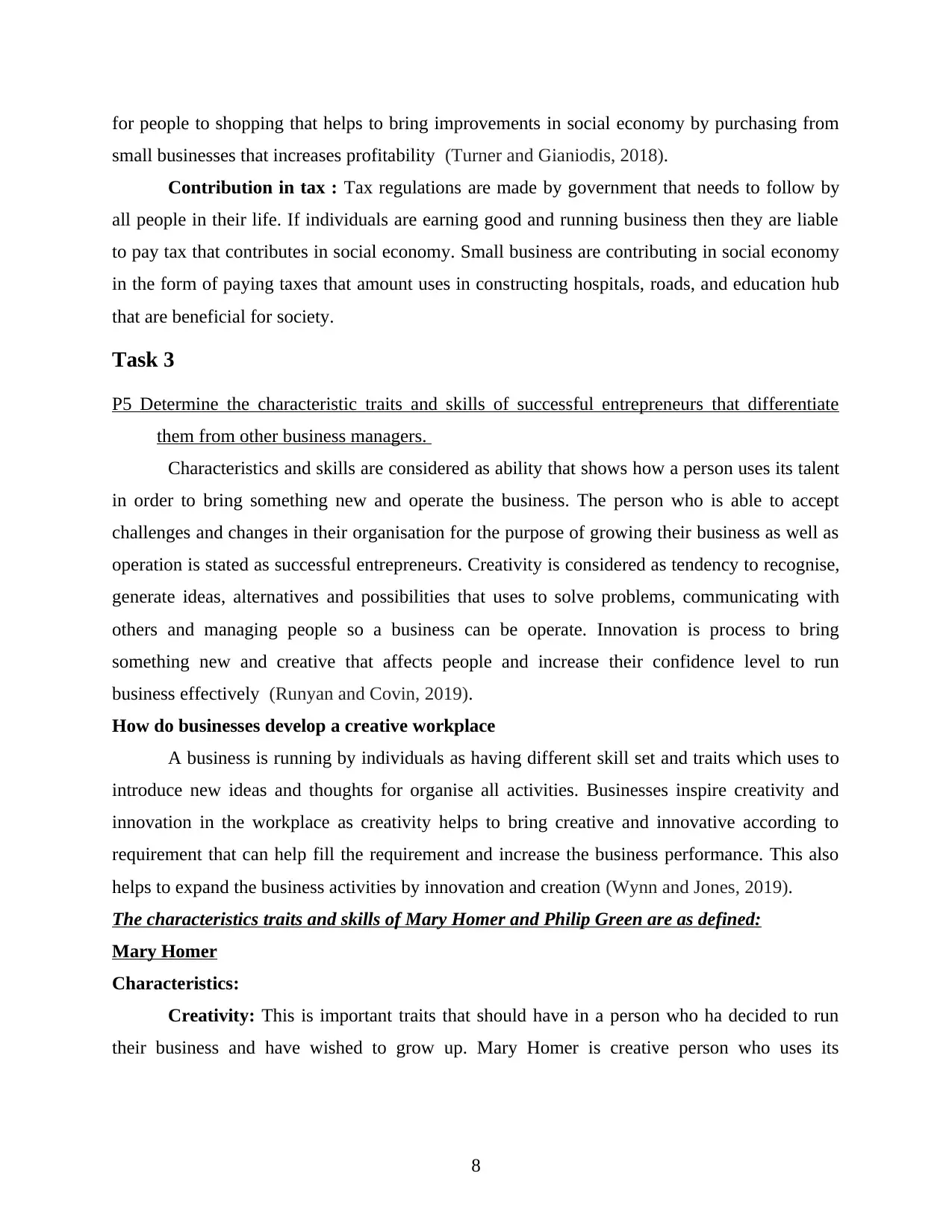
for people to shopping that helps to bring improvements in social economy by purchasing from
small businesses that increases profitability (Turner and Gianiodis, 2018).
Contribution in tax : Tax regulations are made by government that needs to follow by
all people in their life. If individuals are earning good and running business then they are liable
to pay tax that contributes in social economy. Small business are contributing in social economy
in the form of paying taxes that amount uses in constructing hospitals, roads, and education hub
that are beneficial for society.
Task 3
P5 Determine the characteristic traits and skills of successful entrepreneurs that differentiate
them from other business managers.
Characteristics and skills are considered as ability that shows how a person uses its talent
in order to bring something new and operate the business. The person who is able to accept
challenges and changes in their organisation for the purpose of growing their business as well as
operation is stated as successful entrepreneurs. Creativity is considered as tendency to recognise,
generate ideas, alternatives and possibilities that uses to solve problems, communicating with
others and managing people so a business can be operate. Innovation is process to bring
something new and creative that affects people and increase their confidence level to run
business effectively (Runyan and Covin, 2019).
How do businesses develop a creative workplace
A business is running by individuals as having different skill set and traits which uses to
introduce new ideas and thoughts for organise all activities. Businesses inspire creativity and
innovation in the workplace as creativity helps to bring creative and innovative according to
requirement that can help fill the requirement and increase the business performance. This also
helps to expand the business activities by innovation and creation (Wynn and Jones, 2019).
The characteristics traits and skills of Mary Homer and Philip Green are as defined:
Mary Homer
Characteristics:
Creativity: This is important traits that should have in a person who ha decided to run
their business and have wished to grow up. Mary Homer is creative person who uses its
8
small businesses that increases profitability (Turner and Gianiodis, 2018).
Contribution in tax : Tax regulations are made by government that needs to follow by
all people in their life. If individuals are earning good and running business then they are liable
to pay tax that contributes in social economy. Small business are contributing in social economy
in the form of paying taxes that amount uses in constructing hospitals, roads, and education hub
that are beneficial for society.
Task 3
P5 Determine the characteristic traits and skills of successful entrepreneurs that differentiate
them from other business managers.
Characteristics and skills are considered as ability that shows how a person uses its talent
in order to bring something new and operate the business. The person who is able to accept
challenges and changes in their organisation for the purpose of growing their business as well as
operation is stated as successful entrepreneurs. Creativity is considered as tendency to recognise,
generate ideas, alternatives and possibilities that uses to solve problems, communicating with
others and managing people so a business can be operate. Innovation is process to bring
something new and creative that affects people and increase their confidence level to run
business effectively (Runyan and Covin, 2019).
How do businesses develop a creative workplace
A business is running by individuals as having different skill set and traits which uses to
introduce new ideas and thoughts for organise all activities. Businesses inspire creativity and
innovation in the workplace as creativity helps to bring creative and innovative according to
requirement that can help fill the requirement and increase the business performance. This also
helps to expand the business activities by innovation and creation (Wynn and Jones, 2019).
The characteristics traits and skills of Mary Homer and Philip Green are as defined:
Mary Homer
Characteristics:
Creativity: This is important traits that should have in a person who ha decided to run
their business and have wished to grow up. Mary Homer is creative person who uses its
8
Paraphrase This Document
Need a fresh take? Get an instant paraphrase of this document with our AI Paraphraser
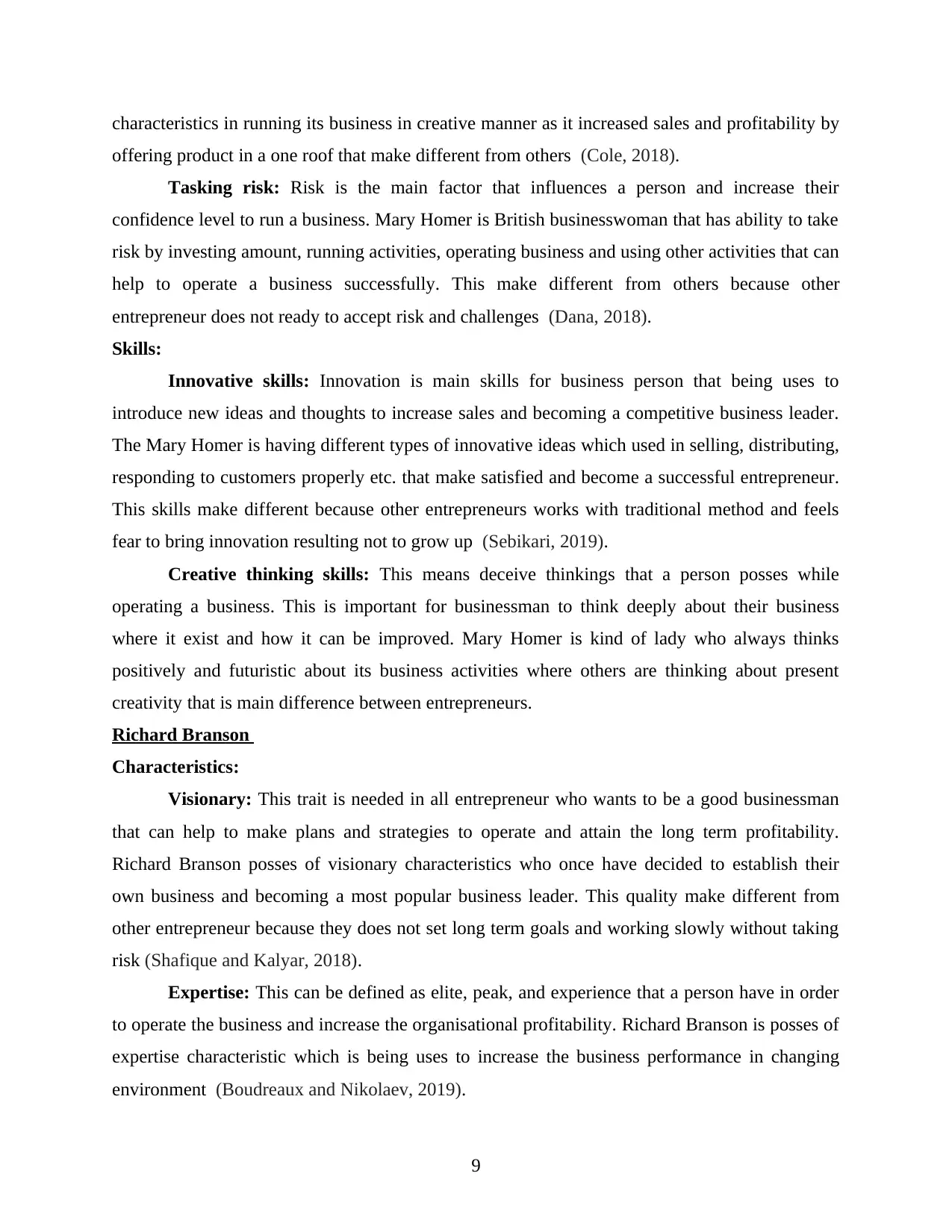
characteristics in running its business in creative manner as it increased sales and profitability by
offering product in a one roof that make different from others (Cole, 2018).
Tasking risk: Risk is the main factor that influences a person and increase their
confidence level to run a business. Mary Homer is British businesswoman that has ability to take
risk by investing amount, running activities, operating business and using other activities that can
help to operate a business successfully. This make different from others because other
entrepreneur does not ready to accept risk and challenges (Dana, 2018).
Skills:
Innovative skills: Innovation is main skills for business person that being uses to
introduce new ideas and thoughts to increase sales and becoming a competitive business leader.
The Mary Homer is having different types of innovative ideas which used in selling, distributing,
responding to customers properly etc. that make satisfied and become a successful entrepreneur.
This skills make different because other entrepreneurs works with traditional method and feels
fear to bring innovation resulting not to grow up (Sebikari, 2019).
Creative thinking skills: This means deceive thinkings that a person posses while
operating a business. This is important for businessman to think deeply about their business
where it exist and how it can be improved. Mary Homer is kind of lady who always thinks
positively and futuristic about its business activities where others are thinking about present
creativity that is main difference between entrepreneurs.
Richard Branson
Characteristics:
Visionary: This trait is needed in all entrepreneur who wants to be a good businessman
that can help to make plans and strategies to operate and attain the long term profitability.
Richard Branson posses of visionary characteristics who once have decided to establish their
own business and becoming a most popular business leader. This quality make different from
other entrepreneur because they does not set long term goals and working slowly without taking
risk (Shafique and Kalyar, 2018).
Expertise: This can be defined as elite, peak, and experience that a person have in order
to operate the business and increase the organisational profitability. Richard Branson is posses of
expertise characteristic which is being uses to increase the business performance in changing
environment (Boudreaux and Nikolaev, 2019).
9
offering product in a one roof that make different from others (Cole, 2018).
Tasking risk: Risk is the main factor that influences a person and increase their
confidence level to run a business. Mary Homer is British businesswoman that has ability to take
risk by investing amount, running activities, operating business and using other activities that can
help to operate a business successfully. This make different from others because other
entrepreneur does not ready to accept risk and challenges (Dana, 2018).
Skills:
Innovative skills: Innovation is main skills for business person that being uses to
introduce new ideas and thoughts to increase sales and becoming a competitive business leader.
The Mary Homer is having different types of innovative ideas which used in selling, distributing,
responding to customers properly etc. that make satisfied and become a successful entrepreneur.
This skills make different because other entrepreneurs works with traditional method and feels
fear to bring innovation resulting not to grow up (Sebikari, 2019).
Creative thinking skills: This means deceive thinkings that a person posses while
operating a business. This is important for businessman to think deeply about their business
where it exist and how it can be improved. Mary Homer is kind of lady who always thinks
positively and futuristic about its business activities where others are thinking about present
creativity that is main difference between entrepreneurs.
Richard Branson
Characteristics:
Visionary: This trait is needed in all entrepreneur who wants to be a good businessman
that can help to make plans and strategies to operate and attain the long term profitability.
Richard Branson posses of visionary characteristics who once have decided to establish their
own business and becoming a most popular business leader. This quality make different from
other entrepreneur because they does not set long term goals and working slowly without taking
risk (Shafique and Kalyar, 2018).
Expertise: This can be defined as elite, peak, and experience that a person have in order
to operate the business and increase the organisational profitability. Richard Branson is posses of
expertise characteristic which is being uses to increase the business performance in changing
environment (Boudreaux and Nikolaev, 2019).
9
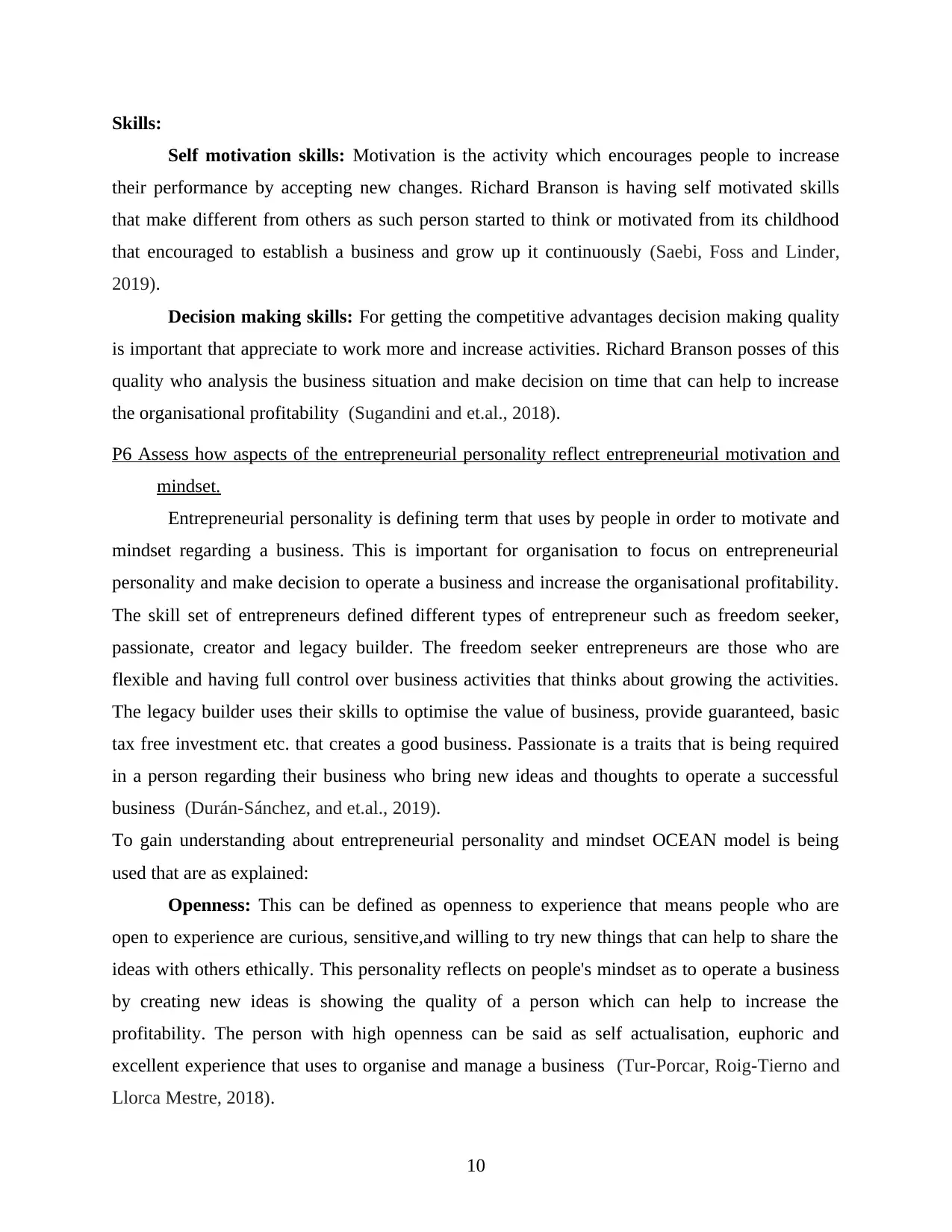
Skills:
Self motivation skills: Motivation is the activity which encourages people to increase
their performance by accepting new changes. Richard Branson is having self motivated skills
that make different from others as such person started to think or motivated from its childhood
that encouraged to establish a business and grow up it continuously (Saebi, Foss and Linder,
2019).
Decision making skills: For getting the competitive advantages decision making quality
is important that appreciate to work more and increase activities. Richard Branson posses of this
quality who analysis the business situation and make decision on time that can help to increase
the organisational profitability (Sugandini and et.al., 2018).
P6 Assess how aspects of the entrepreneurial personality reflect entrepreneurial motivation and
mindset.
Entrepreneurial personality is defining term that uses by people in order to motivate and
mindset regarding a business. This is important for organisation to focus on entrepreneurial
personality and make decision to operate a business and increase the organisational profitability.
The skill set of entrepreneurs defined different types of entrepreneur such as freedom seeker,
passionate, creator and legacy builder. The freedom seeker entrepreneurs are those who are
flexible and having full control over business activities that thinks about growing the activities.
The legacy builder uses their skills to optimise the value of business, provide guaranteed, basic
tax free investment etc. that creates a good business. Passionate is a traits that is being required
in a person regarding their business who bring new ideas and thoughts to operate a successful
business (Durán-Sánchez, and et.al., 2019).
To gain understanding about entrepreneurial personality and mindset OCEAN model is being
used that are as explained:
Openness: This can be defined as openness to experience that means people who are
open to experience are curious, sensitive,and willing to try new things that can help to share the
ideas with others ethically. This personality reflects on people's mindset as to operate a business
by creating new ideas is showing the quality of a person which can help to increase the
profitability. The person with high openness can be said as self actualisation, euphoric and
excellent experience that uses to organise and manage a business (Tur-Porcar, Roig-Tierno and
Llorca Mestre, 2018).
10
Self motivation skills: Motivation is the activity which encourages people to increase
their performance by accepting new changes. Richard Branson is having self motivated skills
that make different from others as such person started to think or motivated from its childhood
that encouraged to establish a business and grow up it continuously (Saebi, Foss and Linder,
2019).
Decision making skills: For getting the competitive advantages decision making quality
is important that appreciate to work more and increase activities. Richard Branson posses of this
quality who analysis the business situation and make decision on time that can help to increase
the organisational profitability (Sugandini and et.al., 2018).
P6 Assess how aspects of the entrepreneurial personality reflect entrepreneurial motivation and
mindset.
Entrepreneurial personality is defining term that uses by people in order to motivate and
mindset regarding a business. This is important for organisation to focus on entrepreneurial
personality and make decision to operate a business and increase the organisational profitability.
The skill set of entrepreneurs defined different types of entrepreneur such as freedom seeker,
passionate, creator and legacy builder. The freedom seeker entrepreneurs are those who are
flexible and having full control over business activities that thinks about growing the activities.
The legacy builder uses their skills to optimise the value of business, provide guaranteed, basic
tax free investment etc. that creates a good business. Passionate is a traits that is being required
in a person regarding their business who bring new ideas and thoughts to operate a successful
business (Durán-Sánchez, and et.al., 2019).
To gain understanding about entrepreneurial personality and mindset OCEAN model is being
used that are as explained:
Openness: This can be defined as openness to experience that means people who are
open to experience are curious, sensitive,and willing to try new things that can help to share the
ideas with others ethically. This personality reflects on people's mindset as to operate a business
by creating new ideas is showing the quality of a person which can help to increase the
profitability. The person with high openness can be said as self actualisation, euphoric and
excellent experience that uses to organise and manage a business (Tur-Porcar, Roig-Tierno and
Llorca Mestre, 2018).
10
⊘ This is a preview!⊘
Do you want full access?
Subscribe today to unlock all pages.

Trusted by 1+ million students worldwide
1 out of 18
Related Documents
Your All-in-One AI-Powered Toolkit for Academic Success.
+13062052269
info@desklib.com
Available 24*7 on WhatsApp / Email
![[object Object]](/_next/static/media/star-bottom.7253800d.svg)
Unlock your academic potential
Copyright © 2020–2026 A2Z Services. All Rights Reserved. Developed and managed by ZUCOL.




